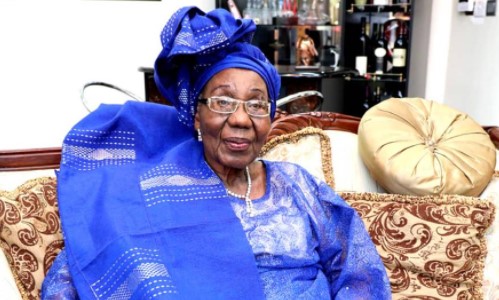Universal folklore tends to cast their type in dim tabloid lights. Hence, the pejorative — “old wives’ tale”. Just to perhaps insinuate the proclivity of old womenfolk for a whole lot of apocryphal legends, passed down by ancestors, some of which appear to be calculated to pacify cranky kids and are, in turn, expected to be transmitted to the next generation in, well, the service and nourishing of superstition.
But from Chief (Mrs.) Jadesola Ibidapo we learnt an entirely different ethic: the evangelism of iwa (Yoruba for virtue) and “suru” (Job-like patience). There is no stone, she would often philosophize, that patience cannot cook into an edible. Her sagacity was not only to be measured from the thought behind that metaphor but also in the manner of expression: a certain knowing chuckle.
According to the one we all came to fondly address as Grandma, trouble increasingly afflicts marriages today and the community is broken only because of the deficit of patience.
Alas, like all mortals, Mama joined her ancestors on September 13 at age 90. In the days ahead, family and the vast community of those impacted by her moral example would undoubtedly assemble to celebrate this exemplary nonagenarian.
Advertisement
With the force of character and the exemplification of hospitality and compassion for others, Mama Ibidapo could be said to have succeeded in investing the honorific “grandma” with greater substance in a way that drew effusive testimonies not only from those with whom she shared biological consanguinity but also with everyone in her community.
This writer counts himself among those Mama impacted positively. Before she became too enfeebled by age, Mama, alongside her late spouse, no doubt constituted a formidable moral force in the entire Fasoro, Surulere community in Lagos. Not a few came for wise counsel or mediation during communal conflicts. Not to mention her compulsive charity to the needy and immeasurable giving to Christian causes.
To assuage the tantrum of a vexing young bride who came for either counsel or counselling, for instance, she would recall, from a photographic memory, countless irritations and transgressions she either overlooked or forgave in order to build her own home or keep her marriage for close to 70 years. After which she would revert to her signature countenance: that knowing chuckle. As if to say, “There is nothing new under the sun!”
Advertisement
To the pranks or delinquencies of the little ones — members of the third or fourth generation of Ibidapos — who constantly streamed to her Surulere sanctuary on family visits, Grandma would rail in mock wrath from her rocking chair and thereafter fix the target of such anger with a stare that was actually half laughter, expressed by her unblinking eyes darting above her little, square reading glasses. No one ever took offence, though. They knew it was her own expression of tough love.
Some of them were on hand to repay those decades of affection by keeping vigil at Grandma’s bedside in her final days. And in her final years, she undoubtedly radiated a joy that could only come from a deep sense of fulfilment.
Watching her being constantly doted upon by loving children and grandchildren, it would be no exaggeration to conclude that indeed she savoured, one morsel after another sumptuous morsel, that proverbial bounteous fruit said to get ripened only by the earlier toils of diligent parenting. So much so that, on her 88th birthday at the outset of Covid in 2020, she told an interviewer: “I’m now awaiting death”.
But that was still not sufficient to keep tears from flowing freely among those truly close to Grandma following the news of her passing, jolted no doubt by the sudden realisation of the loss of such a colossal treasure, climaxing a compelling life story that could, in a way, also be said to partly mirror the evolution of colonial and post-Independence Lagos in the 20th century.
Advertisement
It is impossible to map Mama Ibidapo’s enchanting universe without reference to half of its two hemispheres — her lifelong partner and confidant, Pa Meshack Ibidapo, who predeceased her in 2018. The one she romantically called “Emi mi” (my heart). But let it now be said that there was one other Grandma’s exclusive sobriquet for Grandpa. I will come to that later.
Even in death, the supremely symbolic gesture of closure between the two love birds should not be missed. Romeo died four months shy of his 90th birthday. Now, Juliet made 90 and added six months to boot, as if to avenge on behalf of her co-marathoner who had succumbed just a few inches to the 90th milestone.
Theirs was indeed an extraordinary story of love at first sight. Born into the popular Onigbanjo family of the Olowoogbowo area of Lagos Island, she was by implication a member of the old Eko aristocracy. She was just 17 when they met, he was four years older.
But the journey to matrimony two years later would tax the forbearance of the young lovers.
Advertisement
Having migrated from distant Owo (Ondo state) and not bearing the bloodline of any known member of the Eko nobility meant that her beau was simply derided as “Ara Oke” (a provincial from the hinterland). It was the old colonial Lagos when class counted a lot in amatory adventures and transactions. The “Ara oke” was not considered a good match for the scions and dazzling princesses of the old Eko aristocracy. Though Romeo often dandily turned out in a bespoke ensemble as a young banker at Barclays, her family still sniggered at him.
So treacherous was the pervading climate around their home then that Grandma would recall, in a voice enlivened by nostalgia, how her relentless “Emi mi” often awaited dusk to mount reconnaissance around and adopted whistling as a covert signal to communicate with her from outside, in extraordinary resourcefulness which parallel could perhaps only be found in the lead characters in the magic-realist novel by Gabriel Marquez entitled ‘Love in the Time of Cholera’, Florentino Ariza and Fermina Daza. Only that their own pursuit of love, unlike Marquez’s throes of a plague, was in the ferment of Nigeria’s struggle for independence.
Advertisement
Eventually, love somehow triumphed. But their union was tested by adversity soon afterwards as the young husband lost his job following the arrival of two kids, such that the wife had to resume her petty business to augment their income. That setback would mark a turning point for the young dad as the desire to fend for his family sharpened his entrepreneurial instinct to become self-employed.
Relying on his training in civil engineering at Yaba College of Technology, he soon launched a construction outfit. His diligence and knack for excellence, along with his obsession for details, marked him out in Lagos’ burgeoning real estate market in the countdown to Nigeria’s independence in 1960 and the intensification of the indigenisation policy. So much so that he caught the attention of the colonial authorities who recruited him to help out when the contractor engaged to build the pivotal Tafawa Balewa Square (TBS) was stalling. Panic had gripped the government as the complex was already listed as the venue of the independence ceremonies.
Advertisement
Pa Ibidapo delivered. So, rolled in more big contracts like the construction of the iconic Ahmadu Bello Way and Murtala Mohammed International Airport Road. These fat jobs immediately helped him secure a pre-eminent perch in the post-independence construction industry as well as established him in the millionaire club.
But admission into the club of the new rich in Lagos hardly altered the character of the Ibidapos, nor tempted Grandma to join the ostentatious high society for that matter. All through middle age to the hoary years, her jewellery, for instance, remained unobtrusive. Such affinity with modesty, backed by shrewd investment in an extensive property portfolio during their active years, only helped secure a guarantee for her and her spouse to spend the remainder of their lives in relative comfort.
Advertisement
For Grandma, in particular, the ensuing financial freedom created more incentives to focus more on home-building. In fact, when her brood of four boys and three girls began to marry and have their own kids, she practically converted their Surulere home to a daycare centre. And that home, ornate upholstery, had a unique air around it: orderly like a barrack, serene like a monastery.
Without hesitation, she chose to apportion to herself all the hard, dirty jobs. At a time, one of her grandchildren, a toddler, was diagnosed with a rare condition that required the diligent administration of Cod Oil for a minimum of nine months to heal. Whereas the parent soon began to loathe the idea of having to endure the foul-smelling portion daily, Grandma zestfully took over the task. And six months later, the kid was completely cured of the impairment.
By continuing her life of sacrifice even at old age, she afforded her adult children the latitude to pursue their individual careers. They include Prof (Mrs.) Yemi Olatunji-Bello, vice chancellor of Lagos State University (LASU); Mr Kunle Ibidapo, a retired pilot; and Mr Tayo Ibidapo, a renowned accountant.
Growing up, her last boy, Yinka, recalled: “Mum never tired of reminding us in Yoruba to ‘Ranti omo eni ti iwo nse’ (remember the child of whom you are)”.
When Dr Yemi later had to pursue a one-year post-doctoral fellowship in the US in the 90s, for instance, it was Grandma that seamlessly took over the gruelling job of raising her three young kids in her absence.
For Grandma, the self-assigned chore of babysitting actually provided a unique opportunity to pass on the family values of honour, integrity and respect to the third generation of the Ibidapos. For them to, in the words of Albert Einstein, know the value of things, not hanker after things of value.
Attested Mr Tunji Bello, one of her sons-in-law: “If our children turned out well behaved with impeccable character, the credits surely go to Grandma for all her labour of love,” and, with a tinge of emotion, he added: “Once you married any of her children, you had become her own child to the extent of sometimes favouring in-laws over her own biological children”.
On a personal note, being a fellow Arian, she took a special liking to this writer. Beginning as their tenant — first at a mini flat at Olateju (near Vono) and then a bigger apartment within their Surulere redoubt; later growing into the status of an adopted son. My transition from “downtown” Olateju to more respectable Surulere in the 90s actually resulted from a conspiratorial “packaging” masterminded by —who else? — Mr Bello (then my editor at Concord Press doubling as elder brother and closest friend) based on “insider knowledge”.
A vacancy was about to open up downstairs at the Surulere house. It was already a trying moment at Concord with irregular salaries following the incarceration of MKO, our publisher. Following Mr Bello’s coaching to the letters, I then approached Daddy (Grandpa) and, summoning the effrontery (given that I was already in arrears of rent at Olateju), requested that I be permitted to transfer my tenancy from Olateju to Surulere on the bogus grounds that “I’m preparing to get married soon”.
Ever so generous, Daddy didn’t just approve right away but also wrote off my debt at Olateju on the presentation of a token as a mark of commitment for the new apartment. That debt forgiveness was his own way of demonstrating solidarity with June 12 since I was working for MKO then.
Now, my new abode simply meant I had come directly under Grandma’s radar, day and night. For the five years, I lived with them, I was in a position to observe the uncommon bond both Grandma and her lifelong partner shared; how Daddy never stayed outside beyond 6pm and, sometimes, overheard the old couple chatting till late into the night, every day.
Their constantly looming shadows were, let me now confess, such a restraining influence on me as a young bachelor with a glamorous job as a journalist with a comfortable apartment and a nice car. As Grandma herself once put it in one of our lighter moments together, it was such an enduring puzzle that I didn’t end up becoming her own son-in-law.
That proximity only meant that for five years, I spent every Sunday evening in “fellowship” with Daddy upstairs in the company of Grandma, except when I was out of station or he was not in town. During such chats, I usually would update Daddy and Grandma on political trends during the week by drawing from my professional pouch as a practising journalist in exchange for Daddy’s often rich anecdotes on key issues in business and outstanding political figures in Nigeria’s history through the 60s, 70s, 80s, some of whom he interacted with personally.
Of course, such outings by a member of “OPEC” had “serious implications” each time. Ever a generous host, Grandma always ensured a steady supply of roast meat, adequately lubricated with sweating cold “barrels of crude” (Guinness), even when a “quorum” was not formed on account of the absence of the “Life President” (TB) and Comrade Kayode Komolafe (vice president).
Now fully “retired”, Daddy understandably abstained from indulging in the “lifting of crude oil”, though retaining his nominal title as the life chair of the board of trustees of “OPEC”. It would seem consistent with her modest nature that Grandma categorically chose not to accept any honorary title from “OPEC”, despite all the invaluable support.
On her own part, Grandma had her own unique ways of lightening things up during those convivial Sunday evenings by sometimes recalling her Romeo’s other very “naughty” pursuits in the province of love as a dashing yuppie around Lagos decades earlier.
Only under those extraordinary circumstances did one get to hear Grandma’s cynical inflexion of “Hmm” and, finger-pointing accusatorially, refer to Daddy as “This Baba Landlord”. To which her now old Romeo laughed boyishly at the resurrected ghost of very classified memories. To Daddy’s pregnant laughter, Grandma would revert to her trademark: that knowing smile.
Overall, it was a measure of Grandma’s very accommodating spirit that, for all the five years I lived with them, not once did she have cause to quarrel with or ever frown at me.
Adieu, the ultimate headmistress of the Lagos “Grandma” school.
Odion is the senior technical assistant on media to the president
Views expressed by contributors are strictly personal and not of TheCable.
Add a comment







